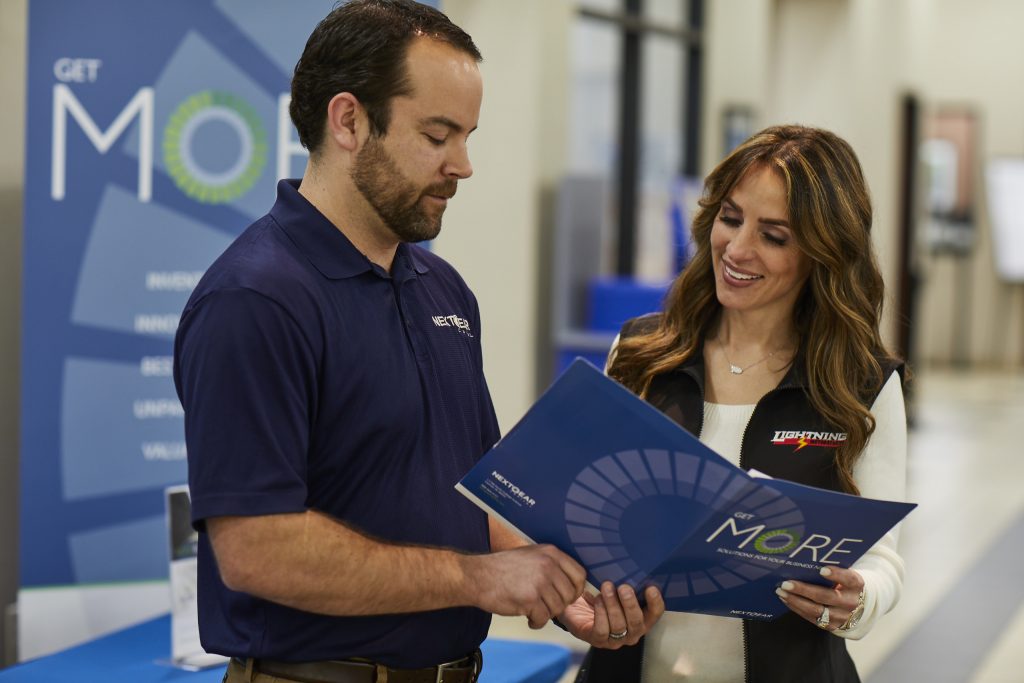Selecting a dealership floor plan provider can be an involved decision for an auto dealer. There are a number of different floor plan providers and banks that all can provide floor planning services. However, like any service, a dealer’s floor plan provider needs to be evaluated on how simple it is to access that extra capital and how those services will fit into a dealer’s existing business. Consider the following questions when selecting a floor plan lender that can not only provide adequate capital for inventory purchases, but can also save your dealership time and help improve dealership cash flow.
Does their technology meet the needs of your dealership?
Auto dealers are extremely busy, and it needs to be simple to get information about the current status of any vehicle on a dealer’s floor plan. Does your floor plan provider have the technology available to improve efficiency for your dealership? Can you view important reports about outstanding balances, inventory types and vehicle turn time? Dealers rely on the accurate information from the technology they use to run and grow their businesses. The ability to swiftly see a daily refresh of important metrics and figures mean that dealers don’t have to worry about time-consuming reporting and can quickly get back to business.
Dealers that choose NextGear Capital as their floor plan provider have access to the myNextGear platform. myNextGear allows dealers to have 24/7 account management access. A comprehensive dashboard gives dealers a high-level overview of the most important metrics for a dealership. Dealers can also securely view inventory, pending transactions, vehicle titles, submit new vehicles for financing, make and schedule payments and also view account analytics.
What’s their customer service like?
Every automotive dealer understands the importance of good customer service, and a business partner that understands your individual business needs. Are you able to easily get any issues resolved? Is there a representative in your area that can visit your dealership? A floor plan provider should be uniquely attuned to the needs and daily struggles of automotive dealers.
Auto dealers that select NextGear Capital have access to a company that is committed to service and customer-centric solutions. Average time to connect with a NextGear Capital team member on the phone is 10 seconds. In addition, dealers get a dedicated account manager to help dealers navigate their floor plan.
What other solutions are provided?
A dealer’s time is valuable. How will your floor plan provider integrate into current dealership processes? Does your dealership floor plan provider have additional services and features that can help save additional time? Though some dealers prefer to utilize a variety of independent vendors, it can be convenient to select a dealership floor plan provider that easily integrates with a network of other services.
The dealers that pick NextGear Capital as their floor plan financing provider have unparalleled access to the Cox Automotive network, and can take advantage of a number of time saving solutions. Solutions such as Rapid Pay allow dealers to floor non-auction purchases and overnight titles with a complementary FedEx waybill. Dealers can also floor plan their transportation due to a partnership with Ready Logistics.
Picking a dealership floor plan is not a simple decision. However, choosing a dealership floor plan provider that can successfully answer these questions is worthy of your dealership’s consideration.






 Sourcing dealership inventory efficiently and effectively is a key component of auto dealer success. Many dealers know their market and know what type of inventory sells, so the next dealership inventory search challenge is finding and sourcing that type of inventory. Utilizing a variety of inventory sources ensures that a dealer can always find the vehicles they are looking for. So, what are the different options available for an auto dealer to find inventory?
Sourcing dealership inventory efficiently and effectively is a key component of auto dealer success. Many dealers know their market and know what type of inventory sells, so the next dealership inventory search challenge is finding and sourcing that type of inventory. Utilizing a variety of inventory sources ensures that a dealer can always find the vehicles they are looking for. So, what are the different options available for an auto dealer to find inventory?
 Automotive dealers use a variety of metrics to measure their dealership’s efficiency and profitability. Of course, some of those metrics include overall revenue and the number of sales made in a particular month. However, there are often other metrics that a dealer should monitor, especially in respect to a dealer’s floor plan financing.
Automotive dealers use a variety of metrics to measure their dealership’s efficiency and profitability. Of course, some of those metrics include overall revenue and the number of sales made in a particular month. However, there are often other metrics that a dealer should monitor, especially in respect to a dealer’s floor plan financing. Many of the best dealerships develop processes and routines that result in overall dealership profitability. A lot of that success can be attributed to dealers who stay disciplined in adhering to the processes they’ve created. One of the many benefits of utilizing an auto floor plan as opposed to cash or a standard bank business loan, is the structure and added discipline it can provide to a dealership’s operations.
Many of the best dealerships develop processes and routines that result in overall dealership profitability. A lot of that success can be attributed to dealers who stay disciplined in adhering to the processes they’ve created. One of the many benefits of utilizing an auto floor plan as opposed to cash or a standard bank business loan, is the structure and added discipline it can provide to a dealership’s operations.
 Dealers rely on fresh inventory and reliable financing to ensure their dealership remains operational. Every dealer has their own preferences and opinions on the type of financing they want to use to purchase inventory. Some dealers prefer to use the cash they have on hand, others use standard bank loans, and others prefer to use a floor planning finance solution. Each type of capital has its own set of benefits and disadvantages.
Dealers rely on fresh inventory and reliable financing to ensure their dealership remains operational. Every dealer has their own preferences and opinions on the type of financing they want to use to purchase inventory. Some dealers prefer to use the cash they have on hand, others use standard bank loans, and others prefer to use a floor planning finance solution. Each type of capital has its own set of benefits and disadvantages.
 Each dealer needs a number of tools and relevant knowledge to help build a profitable and successful dealership. As a partner to each and every automotive dealer and their dealership, our dealer resources are focused on helping dealers succeed. To better serve dealers in navigating the industry, we’ve developed a section of our site that’s dedicated to housing valuable dealer resources.
Each dealer needs a number of tools and relevant knowledge to help build a profitable and successful dealership. As a partner to each and every automotive dealer and their dealership, our dealer resources are focused on helping dealers succeed. To better serve dealers in navigating the industry, we’ve developed a section of our site that’s dedicated to housing valuable dealer resources.
 One of the most frustrating portions of a customer’s car dealership experience is the amount of time it takes for a vehicle transaction to take place. For dealers, it can be frustrating to have a less-than-acceptable inventory turn time. Digital retailing can help both dealers and customers have a more ideal overall car buying experience. For customers, digital retailing means they can easily research all their options, and improve the amount of time it takes to negotiate a deal. For dealers, improving dealership websites with digital retailing tools can help them to acquire warm leads and qualified buyers, which in turn, can improve inventory turn times.
One of the most frustrating portions of a customer’s car dealership experience is the amount of time it takes for a vehicle transaction to take place. For dealers, it can be frustrating to have a less-than-acceptable inventory turn time. Digital retailing can help both dealers and customers have a more ideal overall car buying experience. For customers, digital retailing means they can easily research all their options, and improve the amount of time it takes to negotiate a deal. For dealers, improving dealership websites with digital retailing tools can help them to acquire warm leads and qualified buyers, which in turn, can improve inventory turn times.
 Aged inventory is a problem for each and every dealership. Holding on to aged inventory means your dealership cash flow is tied up into a rapidly depreciating asset. Though utilizing a floor plan can help to prevent your cash from depreciating, creating an inventory exit strategy is essential to ensure a dealership ecosystem of efficiency and profits.
Aged inventory is a problem for each and every dealership. Holding on to aged inventory means your dealership cash flow is tied up into a rapidly depreciating asset. Though utilizing a floor plan can help to prevent your cash from depreciating, creating an inventory exit strategy is essential to ensure a dealership ecosystem of efficiency and profits.


 Dealers who purchase vehicles at auction will often send those cars through a reconditioning process. It typically takes an average dealer seven to 10 days to make sure a car is ready to sell. How much of that time includes the reconditioning process? Depending on the state of the acquired vehicle, the amount of time reconditioning takes can vary. However, there are always steps dealers can take to improve the amount of time it takes for a vehicle to go through the reconditioning process.
Dealers who purchase vehicles at auction will often send those cars through a reconditioning process. It typically takes an average dealer seven to 10 days to make sure a car is ready to sell. How much of that time includes the reconditioning process? Depending on the state of the acquired vehicle, the amount of time reconditioning takes can vary. However, there are always steps dealers can take to improve the amount of time it takes for a vehicle to go through the reconditioning process.